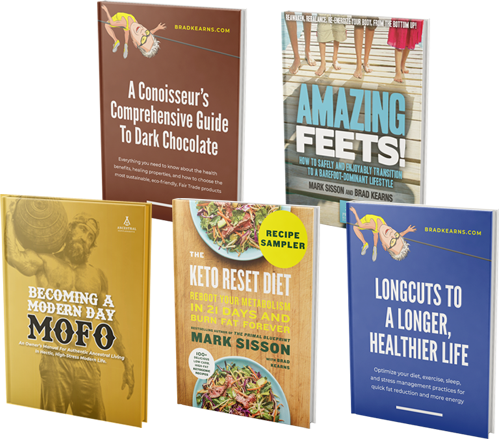One of the most badass feats I’ve seen in recent years was in this video of Lester Wright, who, at 100 years old, ran a 100-meter race and after finishing, said: “I feel like I’m just getting started…this was nice, but I wanted a longer race.” Alright, Lester!
Lester’s ability to perform this impressive (and inspiring) achievement at his age made me think of something that has been on my mind ever since I talked to Jay Feldman about his compelling and controversial energy balance movement and if hormesis is even healthy. I first heard Jay on Ben Greenfield’s podcast, and his ideas really spoke to me as someone who is part of the group of people who are trying to get maximum energy to perform, and also opened my mind to the possibility that activities that induce hormesis, like taking a cold plunge, fasting, going in the sauna, and engaging in extreme exercise, (and doing all of the aforementioned at age 57 just to add another stress factor!) can be overrated.
Another idea that intrigued me was that in particular, healthy, fit athletic types really do not need to fast, and further, may even be harmed by trying to fast and/or restrict carbs! It’s easy to automatically assume that more is better, that you can go slam a hard workout while you’ve “fasted” for extra points, but the reality is, anything that turns down the flame when we are trying to perform and recover can have harmful effects.
Duly inspired, I’ve been trying to make my huge smoothie right away and eat extra food in the morning, and at other times too. One quick takeaway I got from the episode was that when we are fasting, we are activating stress hormones to liberate energy from storage. That is great—if you need to lose excess body fat—however, I already activate my stress hormones enough during workouts. If you stress yourself out by lifting heavy things AND fasting, you are simply overdoing it. Oh, and don’t forget about the effect of a cold plunge—just adding more stress hormones to the situation!
I intuitively discovered this several months ago: on THREE separate occasions I performed a sprint workout, followed it up with a cold plunge, and then later that afternoon, felt totally torched. We’re talking about achy muscles and heavy fatigue. After the third time it happened, I made the connection that sprinting combined with a cold plunge is just too much (this however is not related to the idea of waiting a while after workouts for cold therapy for hypertrophy goals, as this is a separate issue).
I also reflect back during my heavy keto phase when writing Keto for Life and how I would crash and burn often—like 24-36 hours after a sprint workout and extended fast, I would just completely bomb out for a nap (not a nice nap, but a desperation nap). There were additional stress factors at that time too, like going through a divorce, so there definitely was an accumulation of stress factors. I would already be in a fasted state, then I’d go sprint, I wouldn’t eat right away after, and when I did, I’d eat a meal that had a minimal amount of carbs….Sometimes I have to take a look at my calendar and realize I’m in my 50s….and that all this is far too much!
Back to the Energy Balance show that has inspired me so much—these guys are saying to optimize mitochondria energy production we might eat every few hours, balance carbs, protein, and fat, and especially avoid processed food like seed oils, as these hamper mitochondria function. And of course, don’t waste time and energy on stupid workouts!
Another big premise to consider: Faster metabolism = longevity. This idea counters all the Peter Attia talk, all the Mark Sisson talk, and especially all the Valter Longo talk that if you want to live longer, you need to eat meagerly. In contrast, these energy balance guys critique calorie restriction studies with rats (and we can do the same) with the general idea that they are eating crappy laboratory food in these studies, so eating less crap food is always going to be better than eating more crap food. Remember, virtually all the ‘research’ about how calorie restriction promotes longevity is done with lab rats because we can’t test the starvation diet on humans.
Dr. Tommy Wood said something similar on the matter with this epic one-liner: “Healthy active folks should aspire to eat as much nutritious food as they can…until they gain a pound of fat, then tone things down a little bit.”
Now, we must embrace the idea that most people have a problem with excess energy storage, not enough energy burning, poor mitochondrial health (which many experts contend is the root cause of all diseases), and metabolic health, where they suck at burning energy. These people do not need to eat every three hours, but would instead greatly benefit from ditching seed oils and processed foods and turning on mitochondria, moving more, and exercising more.
Once we proceed on the path to health, the more active and productive we are (and there is of course the happiness we can generate from being active and productive), the more muscle mass we can preserve, the more nutritious food we can assimilate, then perhaps the longer and healthier we live.
But the danger with trying the caloric restriction route is that it turns down a bunch of dials and even if this helps longevity, we are going to be hunched over, shuffling through our garden at age 100, instead of running an epic 100-meter race in front of 38,000 people at the age of 100! I choose the latter.









